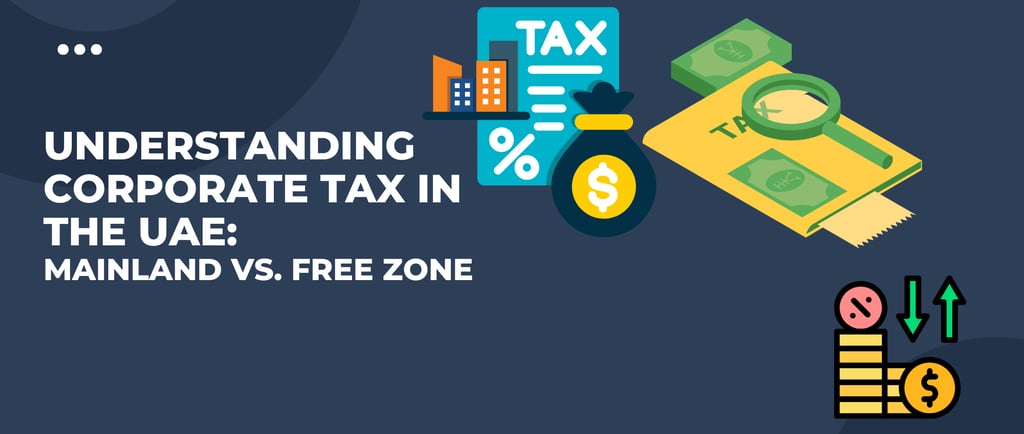Understanding Corporate Tax in the UAE: Mainland vs. Free Zone
Explore the key differences in corporate tax obligations between mainland and free zone businesses in the UAE to make informed decisions for your company.
4/2/20252 min read


Understanding Corporate Tax in the UAE: Mainland vs. Free Zone
The UAE’s corporate tax framework divides businesses into two categories based on their registration location—Mainland and Free Zone. Each category has distinct tax obligations that can significantly impact business operations and financial planning. Choosing the right jurisdiction is crucial for tax efficiency and compliance.
At ALWAHAT ACCOUNTS & INTERNAL AUDIT SERVICES, we help businesses navigate corporate tax complexities in the UAE. This guide explores the key differences between corporate tax in the mainland and free zone areas, helping you make informed decisions.
Mainland vs. Free Zone: Business Structures
Mainland Businesses
Mainland companies operate under the UAE’s general legal framework and economic departments. They enjoy unrestricted trade within the UAE and internationally. In some cases, a local sponsor may be required. Business hubs like Dubai, Abu Dhabi, and Sharjah fall under the mainland jurisdiction.
Free Zone Businesses
Free zones are designated economic areas offering incentives like 100% foreign ownership, tax benefits, and profit repatriation. However, they have restrictions when dealing with mainland companies unless they obtain the necessary licensing. Popular free zones include Jebel Ali Free Zone (JAFZA) and Dubai International Financial Centre (DIFC).
Corporate Tax: Key Differences
Tax Rates
Mainland Businesses:
Above AED 375,000 taxable income → 9% corporate tax
Up to AED 375,000 taxable income → 0% corporate tax
Free Zone Businesses:
Qualifying Income → 0% corporate tax
Non-Qualifying Income → 9% corporate tax
Unlike mainland businesses, free zone entities do not have a tax threshold; their tax rate depends solely on the nature of their income.
Corporate Tax Scope
Mainland businesses are taxed on all activities, with exceptions for government and certain public benefit entities.
Free zone businesses must meet Qualified Free Zone Person (QFZP) criteria to maintain tax benefits. Excessive engagement with mainland entities can result in losing this status.
Withholding Tax
Both mainland and free zone businesses benefit from a 0% withholding tax (WHT) on domestic and international transactions, enhancing business flexibility.
Choosing the Right Setup: Mainland or Free Zone?
The ideal jurisdiction depends on your business goals:
Mainland registration is best for companies targeting the UAE’s local market, as it allows unrestricted trade.
Free zone registration is suitable for businesses with minimal mainland interactions, offering significant tax advantages.
Final Thoughts
Corporate tax regulations in the UAE vary significantly between mainland and free zone businesses. Mainland companies face a 9% tax if their taxable income exceeds AED 375,000, whereas free zone businesses can benefit from a 0% rate for qualifying income. Business structure, tax benefits, and long-term strategies must be carefully assessed before choosing a jurisdiction.
ALWAHAT ACCOUNTS & INTERNAL AUDIT SERVICES provides expert guidance in corporate tax compliance, AML regulations, and business structuring. Whether you are a new business or an established company, our team can help you maximize tax efficiency and ensure regulatory compliance. Contact us today for a consultation!
Address
Faisal 2 Bldg, Office No 203, King Faisal St, Al Nad- Al Qasimia, Sharjah, UAE
Level 17, World Trade Center, Khalifa Bin Zayed, the first street- Abudhabi
Unit 32 -
4th Floor, AWR Properties - Al Fahidi Heights Office Tower, beside Central Mall ,near Sharaf DG metro station exit 4,Dubai ,U.A.E
Contacts
info@alwahataudit.com
+971589373943
We empower you to make well-informed decisions and successfully attain your financial objectives.


All copyrights reserved @Al-Wahat Accounts & Internal Audits | Designed - Abhijith.digital
Subscribe to our newsletter


